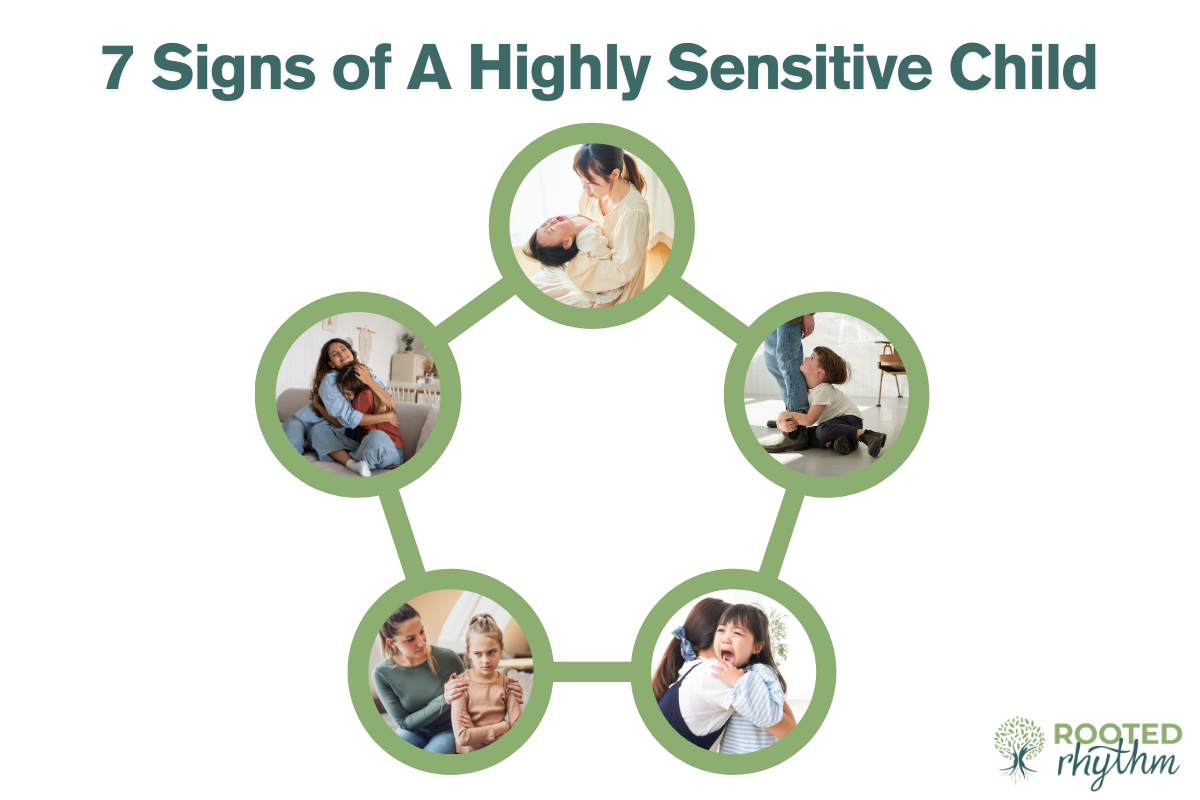7 Signs of a Highly Sensitive Child & How to Support Them
As a parent, struggling with your kids when it comes to dealing with their big emotions, what may seem like tantrums, and power struggles often leaves parents hand-tied, worried, and confused as to where they went wrong or how they can build a connection with their kids that ends up resolving conflicts. You’re not alone. These may be signs of a highly sensitive child.
First of all, take a deep breath. You have got this. While all children are unique, some feel things more intensely, and that’s okay. The first step is to recognize whether your child is highly sensitive. As long as you recognize signs of a highly sensitive child, you’ll not only feel more grounded in your parenting but also better equipped to meet your child’s emotional needs with confidence and compassion.
What Does It Mean to Be a Highly Sensitive Child?
According to research, about 20% of the population is highly sensitive. Being a highly sensitive child isn't a diagnosis, it's a trait, a temperament, a way of experiencing the world that runs a little deeper. These children are often incredibly perceptive, noticing subtleties in their environment that others miss. A change in tone, a shift in mood, the flicker of emotion on someone’s face, these don’t go unnoticed. Their nervous systems are wired to take in more information and feel it more intensely.
This emotional sensitivity and intensity can show up in many ways. Some children are deeply affected by loud noises or scratchy tags on clothing. It's not just that they feel more, it’s that they process more. Understanding the signs of a highly sensitive child early on can provide them with the support they need.
Common Misconceptions About Highly Sensitive Kids
Due to unawareness and thus failing to recognize signs of a highly sensitive child, it can lead to misconceptions about a sensitive child. Let’s debunk some of these together. People may label them as “too emotional,” “shy,” or “dramatic,”. One of the most common misconceptions about sensitive kids is that they’re weak or need to “toughen up.” When we see past the stereotypes and understand the signs of a highly sensitive child, we’re better equipped to support their unique strengths.
Challenges Parents Often Face When Dealing With a Highly Sensitive Child
One of the most unexpected challenges parents face after noticing the signs of a highly sensitive child is not just managing the child’s intensity, but holding space for their own emotional reactions. The constant vigilance, the emotional coaching, and the unpredictability of what might overwhelm their child. It can feel like walking on eggshells. Parents often wrestle with guilt, wondering if their child’s reactions are a reflection of their parenting. There’s also the quiet grief of needing to decline invitations, cut outings short, or skip experiences others seem to enjoy with ease. And beneath it all, a longing to help their child belong in a world that often feels too loud, too fast, too much. Supporting a sensitive child isn’t about fixing them, it’s about learning to parent in a way that honors their nervous system without abandoning your own. Read the qualities of a good parent here.
7 Signs of a Highly Sensitive Child
1. Overwhelm in New or Chaotic Environments
From school trips to birthday parties, the signs of a highly sensitive child often show up when routines shift. Too much noise, unpredictability, or stimulation can be disorienting. It’s not uncommon for these children to feel unsettled at the beginning of an event and only start to enjoy it once the intensity fades.
2. Strong Reactions to Injustice or Unkindness
Fairness matters deeply to highly sensitive children. Whether it’s a friend being excluded or a stranger being mistreated, they tend to notice and they care. When they feel unheard or dismissed in these moments, they may respond with frustration or tears.
3. Sensitivity to Sensory Input
Bright lights, loud noises, itchy clothing, or certain food textures can all be too much. These physical sensitivities are another clear sign of a highly sensitive child. What might be a minor annoyance to others can feel unbearable to them.
4. Difficulty with Decision-Making Under Pressure
A simple question like “What do you want for lunch?” can become stressful for a highly sensitive child. They weigh every option, imagine every consequence, and feel the pressure of needing to get it “right.” When rushed, they may become frustrated or indecisive. Add time pressure or impatience from a parent, and the situation becomes even harder. This tendency to overthink everyday decisions is a key sign of a highly sensitive child.
5. Perfectionism and Pressure in Testing Situations
Another sign of a highly sensitive child is their complex relationship with testing or evaluations. Even when they know the material, the pressure to perform can be overwhelming. Their minds don’t just search for the right answer, they explore why each option might work, sometimes doubting what feels too easy. When their thoughtful reasoning leads to an unexpected mistake, their confidence can take a hit. Over time, these small setbacks can snowball into test anxiety or fear of being wrong.
6. The Need for Reassurance at Bedtime - Powerful Sign of a Highly Sensitive Child
One of the subtler yet powerful signs of a highly sensitive child is their need for emotional security, especially at the end of the day. Going to bed without a goodnight kiss or a moment of connection can stir up quiet distress. You might not always see it, but in the stillness of their room, questions echo: “Do they still love me?” “Was I too much today?” For highly sensitive children, family harmony is a source of emotional safety. A simple kiss, a warm cuddle, or reassuring words at bedtime can anchor them, allowing their tender hearts to settle and truly rest.
7. Deep Empathy and Emotional Absorption
Highly sensitive children often seem to feel with others. When a classmate is sad or a sibling is upset, they may cry, worry, or carry that emotion for hours, or even days. The grief or joy of others doesn’t just affect them; it becomes part of their internal experience.
How to Support Your Child after Sensing the Signs of a Highly Sensitive Child
Once you begin noticing the signs of a highly sensitive child, your awareness becomes a powerful tool for connection. A 2019 study found that highly sensitive 3-year-olds developed typically by age 6 when supported by emotionally responsive parents. When supporting a highly sensitive child, here’s something all parents can try:
1. Prioritize Safety Through Secure Attachment
From the earliest stages of development, highly sensitive children need to feel anchored in their relationship with their caregivers. Because their nervous systems are so finely tuned, even mild stressors can quickly activate a fight-or-flight response. In these moments, your calm, connected presence helps their bodies shift from high alert back toa place of safety. Simply being near, emotionally available, and responsive is one of the most healing supports you can offer after recognizing the signs of a highly sensitive child.
2. Validate Big Emotions
Highly sensitive children feel joy, sadness, anger, and wonder with full intensity. What may seem like an overreaction to us is, for them, a deeply felt truth. Instead of minimizing their feelings, make space for them. Offer language like, “That mattered to you,” or “It makes sense that you feel upset.” When you consistently validate their emotional world, they learn to trust their inner experiences and regulate those feelings over time.
3. Protect Their Empathy
One of the most remarkable signs of a highly sensitive child is their innate empathy. But this gift can be exhausting when they’re exposed to too much emotional weight. Avoid using guilt or emotional persuasion, and be mindful about how much sadness or injustice they’re exposed to, especially when they’re young. Empathy is a strength, not a burden to carry.
4. Respect Their Need for Downtime
Socializing, school, parties, even family gatherings, all come with stimulation that can drain a highly sensitive child. After noticing the signs of overstimulation (like meltdowns, withdrawal, or fatigue), offer them restorative time alone. Whether it’s quiet play, a cozy reading nook, or a walk outside, giving them space to decompress helps prevent emotional overload.
5. Teach Body Awareness and Boundaries
Highly sensitive children often lose touch with their physical cues due to emotional overwhelm. Help them tune back in. Ask questions like, “How does your tummy feel after that snack?” or “What do you notice in your body when you’re around that friend?” This gentle awareness helps them build a strong sense of boundaries and intuition that they can carry for life.
6. Allow Time for Processing
One of the hallmark signs of a highly sensitive child is their depth of processing. They don’t just take in information, they turn it over, analyze it, and connect it to other ideas. In a fast-paced world, this can look like slowness, but it’s actually a beautiful cognitive gift. Offer them the time they need to think things through, and resist the urge to rush or finish their sentences. Patience tells them: “You’re allowed to move at your own pace.”
7. Provide Gentle, Balanced Stimulation
Because their brains process everything so thoroughly, it’s important to be intentional about the kind of stimulation they receive. Too much chaotic input can lead to obsessive or anxious thinking. On the other hand, the right kind of challenge, creative play, nature walks, and meaningful conversations can channel their focus and imagination into growth. Take this quiz to begin understanding whether your child might demonstrate gifted characteristics.
When to Consider Outside Support
Even with all your love, patience, and attunement, there may be moments when your child’s sensitivity feels bigger than what you can hold alone, and that’s okay. If you’re noticing persistent overwhelm, challenges at school, or ongoing emotional struggles despite your best efforts, it might be time to reach out for support. Working with professionals who understand the signs of a highly sensitive child can provide both clarity and relief. At Rooted Rhythm, our Tuned In Parenting course is designed to guide you through this journey with practical tools, emotional insight, and a deep respect for your child’s unique wiring. It’s not about fixing your child, it’s about learning how to walk with them gently through a world that often feels overwhelming. Curious about more patterns? Explore the 10 habits of highly sensitive children.
Do you have a highly sensitive child?
We have created a course (Tuned In Parenting Course) that covers all from parenting techniques, to self-regulation, setting expectations, healthy boundaries and so much more. If you feel like starting with a sneak peak visit our Instagram page or check our mini courses: The Highly Sensitive Child and Parenting Essentials. We created these resources with care, and our hope is that they bring you clarity, support, and a sense of ease in your parenting journey.


